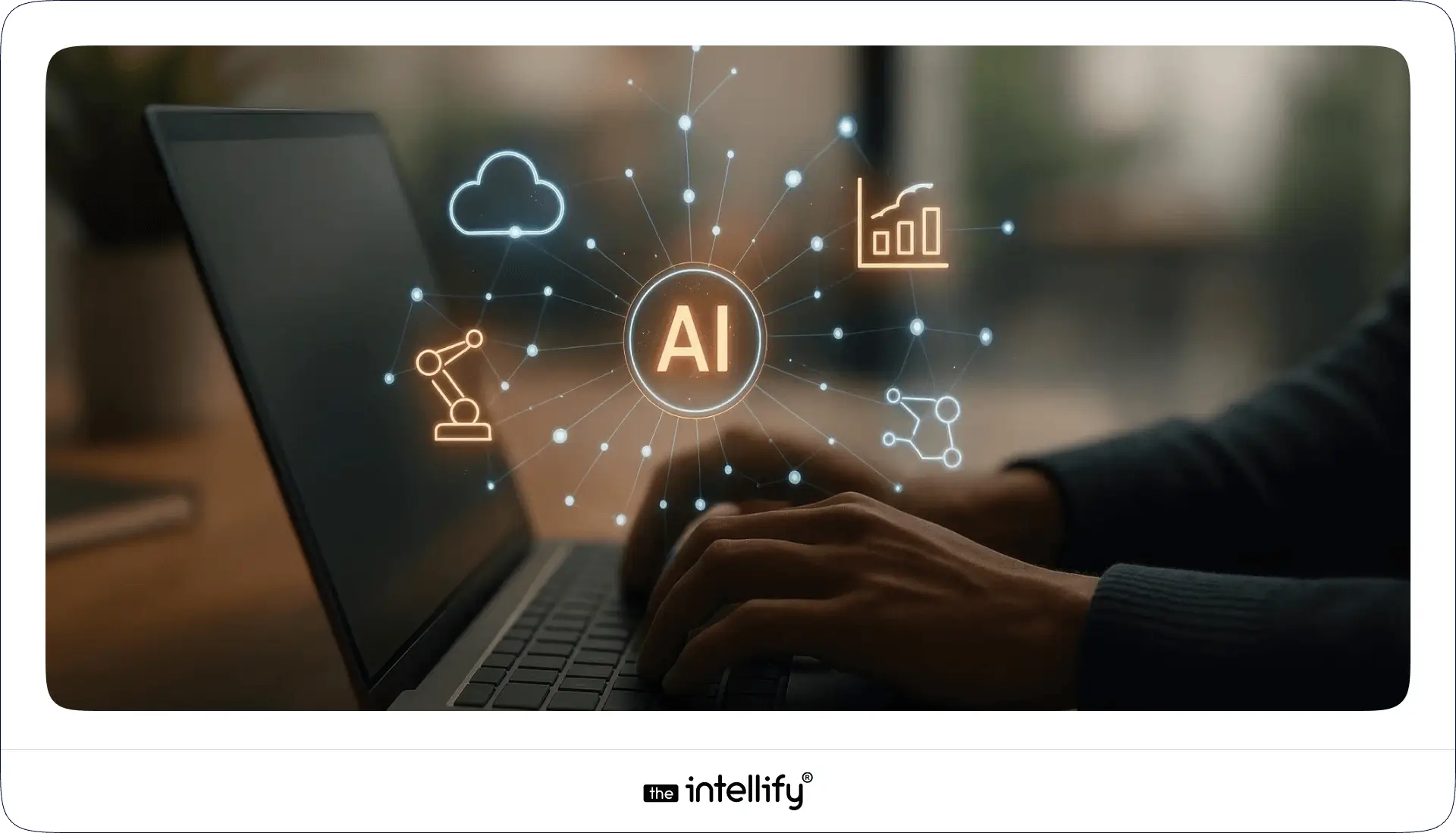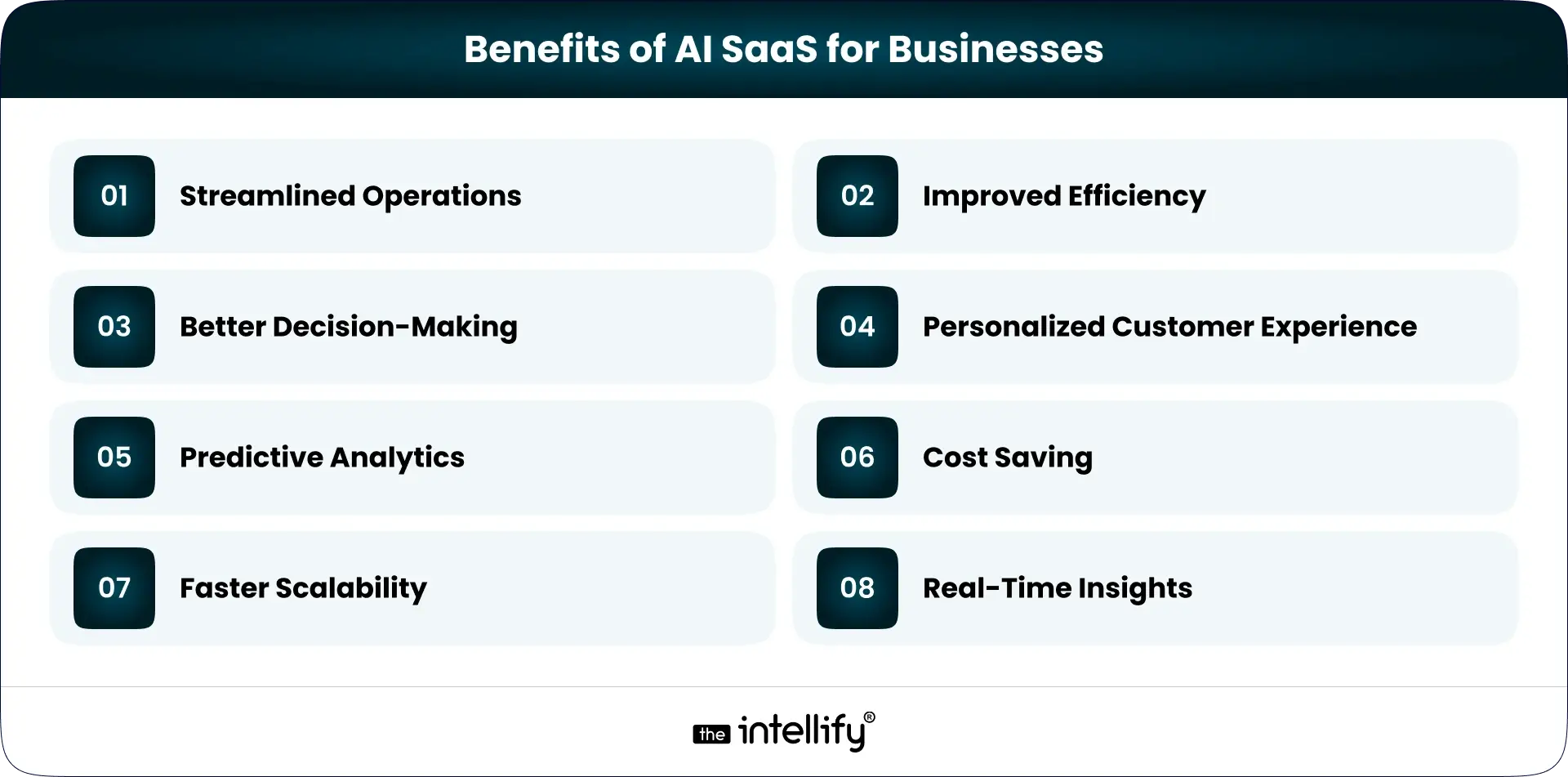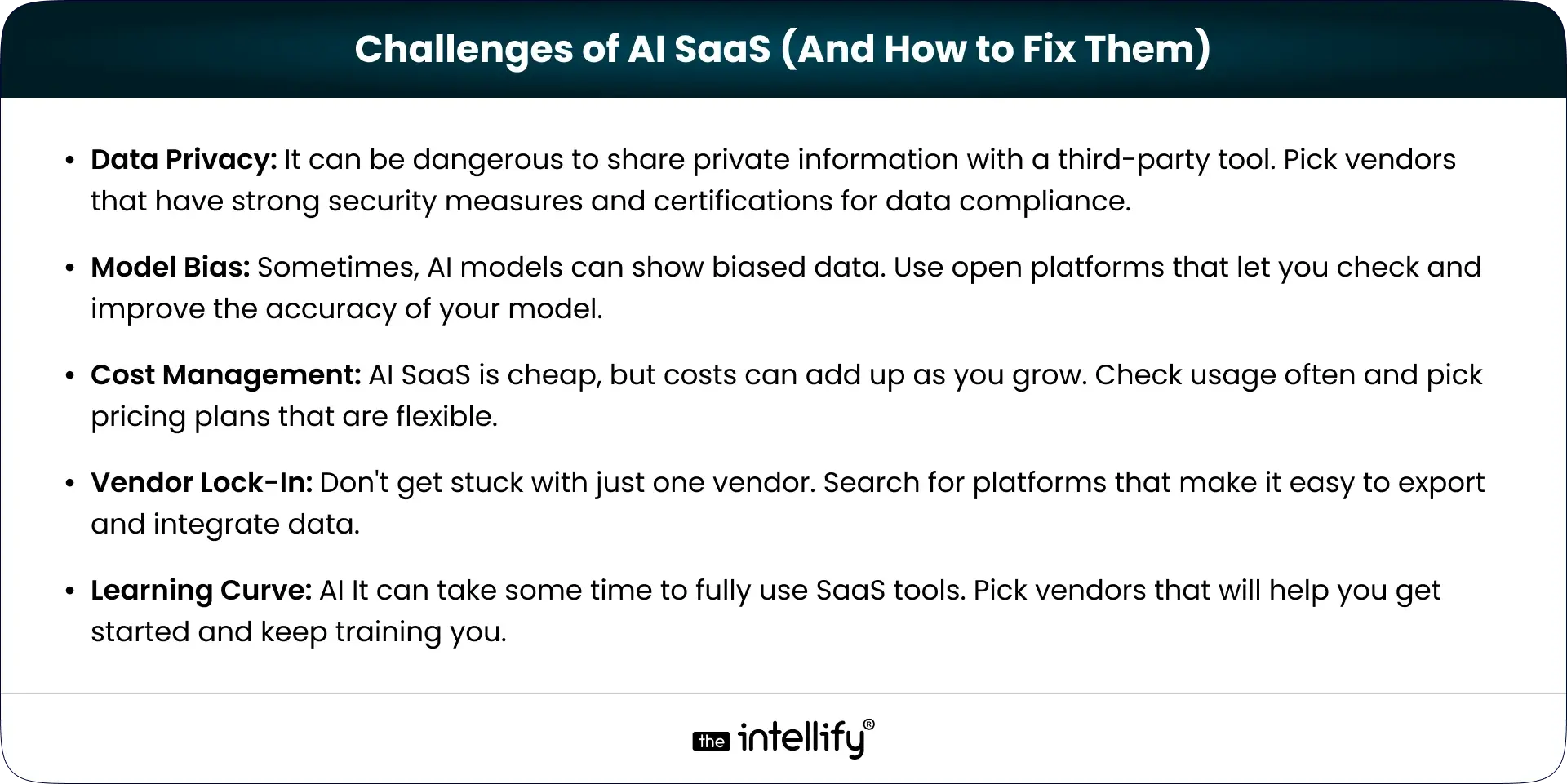Summary
This blog talks about how AI SaaS (Artificial Intelligence Software as a Service) is changing the way companies work in 2025. AI SaaS is now a key part of digital strategies in many fields, from automating workflows to making decisions based on data to improving customer service. In this blog, you’ll learn about the main benefits, use cases, and important things to think about when choosing an AI software development company. This guide will help you understand how to use AI in SaaS to grow your business faster and make it last.
Rise of AI SaaS in 2025
In 2025, Artificial Intelligence (AI) is no longer just a trend; it’s a must-have for businesses. One of the most exciting advancements is the rise of AI SaaS, where AI and cloud-based software come together. Companies of all sizes are adopting AI Saas to boost productivity, make better decisions, and tailor customer experiences. AI SaaS is helping businesses to stay ahead as competition heats up.
Before, only big businesses had the resources to access AI. Now, thanks to SaaS delivery models, even SMEs and startups can afford cutting-edge AI tools.
AI SaaS: Explained

AI SaaS stands for Artificial Intelligence Software as a Service. It means cloud-based software applications powered by AI technologies like machine learning, natural language processing, and data analytics. These tools do more than just automate tasks; they also learn from data, change based on how users act, and give you real-time information. Companies can use them online without having to buy expensive hardware or pay for maintenance.
Why AI in SaaS Is a Game-Changer?
Traditional SaaS tools make workflows easier and cut down on the need for manual work. But when you add AI, the software becomes intelligent. It understands patterns, makes predictions, and suggests actions. The shift from automation to intelligence is what makes AI SaaS a game-changer. It helps businesses make better decisions, serve customers better, and move faster.
AI is more than just automation. For example, a regular CRM keeps track of contact information and interactions, but an AI-powered CRM can figure out which leads are most likely to convert and suggest the best time to follow up. This information gives teams a big edge in terms of performance and accuracy.
Key Benefits of AI SaaS for Businesses

Streamlined Operations
AI SaaS tools make it easier for businesses to automate daily tasks like data entry, scheduling, and reporting, which gives teams more time to focus on their main work.
Improved Efficiency
Companies can get more done in less time and with fewer resources when AI takes care of repetitive tasks and makes processes more efficient.
Better Decision-Making
AI quickly analyzes large datasets and gives leaders useful information that helps them make better business decisions based on real-time data.
Personalized Customer Experience
AI-powered SaaS platforms keep track of what customers do and like so they can give them personalized experiences that make them happier and more loyal.
Predictive Analytics
AI can help businesses stay ahead of the game by predicting trends and customer needs.
Cost Saving
Businesses can save money and improve quality by automating tasks and lowering the number of mistakes made by people.
Faster Scalability
AI SaaS platforms can easily grow, so businesses don’t have to worry about technical problems when they do.
Real-Time Insights
AI SaaS tools give businesses up-to-date information that helps them act quickly and with confidence by constantly monitoring and analyzing data.
AI SaaS also lets people work from home. Cloud-based AI tools let teams work together smoothly, automate processes between teams, and keep projects moving, no matter where employees are located.
Real-World AI SaaS Use Cases

Sales & Lead Generation
AI SaaS tools can identify high-quality leads, predict customers’ intent, and personalize outreach to boost conversions. They can rate leads based on how engaged they are and suggest sales scripts that fit how buyers act.
Marketing Automation
AI helps marketers run smarter and more effective campaigns by dividing audiences into groups and automatically creating content. It can also do A/B testing on its own, picking the content that works best in real time.
Customer Support
AI-powered chatbots and virtual agents are available 24/7 to answer questions, which speeds up response times and makes customers happier. These tools can also understand natural language and send complicated problems to human agents.
Finance
AI tools handle billing, find fraud, and give you financial forecasts to help you plan and budget. Real-time risk analysis can also let decision-makers know about problems or mistakes in transactions.
HR
AI SaaS helps with resume screening, tracking employee engagement, and planning the workforce in human resources. It can even guess how many employees will leave or find skill gaps in the team.
Healthcare
AI in healthcare helps with things like analyzing medical images, making appointments, and keeping an eye on patients from afar, all of which improve care and efficiency. AI tools can also help find diseases early by looking at electronic health records (EHRs).
Key Industries Being Transformed by AI SaaS

Retail
AI SaaS helps stores recommend products, keep track of their stock, and make better predictions about how much they will sell. Smart checkout systems and visual search are also making the shopping experience better.
Healthcare
Hospitals and clinics use AI SaaS to help with diagnosis, talk to patients, and do administrative work. It makes it possible to diagnose problems from a distance and makes things easier for medical staff.
Banks & Finance
Banks use AI for credit scoring, fraud detection, and automating customer service. Intelligent chatbots offer real-time support, and AI risk models help people make better investment choices.
Manufacturing
AI SaaS helps factories with predictive maintenance, quality control, and process optimization. It helps factories cut down on downtime and make their production lines more efficient.
Real Estate
Real estate platforms use AI to figure out how much a property is worth, automate listings, and make personalized suggestions for buyers. AI can also tell you when the best time is to buy or sell a property based on how the market is doing.
Education
Schools and EdTech platforms use AI to make learning more personal, grade papers automatically, and keep an eye on how well students are doing. Adaptive learning systems and AI tutors are helping students do better.
Key Features to Look for in an AI SaaS Product
- Easy integration with your current tools
- Real-time analytics dashboard
- Customization options
- Secure data handling and compliance (e.g., GDPR)
- Continuous learning and updates
- Scalable pricing based on usage
- Strong customer support and training resources
- API access for custom extensions
- Transparent AI models and ethical standards
Choosing an AI SaaS product with these features ensures long-term usability, growth, and trust.
How AI SaaS Helps You Scale Your Business
AI SaaS grows with your business as it does. It can handle more data, serve more customers, and support more users without needing a lot of money to build up its infrastructure. You can quickly add new features or move into new markets. AI SaaS is the best way to grow your business without stress because it is flexible and powerful.

How to Select the Right AI SaaS Solution for Your Business
Choosing the right AI SaaS partner is a strategic choice that can shape of your business. There are so many platforms to choose from that finding the right one goes beyond just price and features. It’s about making sure the solution fits your specific business goals, operational needs, and long-term plans.
Here are some important things to keep in mind when picking the right AI SaaS development company for your business:
- Identify your specific business needs
- Compare features and pricing
- Check user reviews and case studies
- Test with a free trial or demo
- Ensure the provider offers support and regular updates
- Ask about integration capabilities and training resources
- Evaluate the vendor’s roadmap and reputation
- Look for industry-specific solutions
AI SaaS vs Traditional SaaS: What’s the Difference?
| Feature | Traditional SaaS | AI SaaS |
|---|---|---|
| Automation | Rule-based | Intelligent & adaptive |
| Data Processing | Manual or basic | Predictive & real-time |
| Personalization | Limited | Highly tailored |
| Learning Capability | None | Continuously improves |
| Decision Support | Minimal | Insight-driven suggestions |
| Customization | Standard workflows | Dynamic based on behavior |
AI SaaS brings a smarter, more responsive experience that goes beyond traditional automation.
Future of AI SaaS: What to Expect in the Next 5 Years
AI SaaS will keep changing quickly. You can expect interfaces to be easier to use, more personalized, and smarter integrations. Most platforms will probably have generative AI built in, which will let users make content, code, and insights right away. As more people use AI, there will also be more focus on how to govern it and use it ethically.
Final Thoughts
AI SaaS isn’t just a new tech trend; it’s a big change in the way software is made and used. It gives businesses the tools they need to make better choices, work more efficiently, and give customers better service. Adopting AI SaaS could be the key to staying competitive and growing successfully as 2025 goes on.
Now is the time to look into how AI SaaS can help your business grow, whether it’s a startup or a big company.
Frequently Asked Questions (FAQs)
1. What is AI SaaS and how can it help my business grow?
AI SaaS stands for “Artificial Intelligence Software as a Service.” It is cloud-based software that uses AI. It automates boring tasks, gives you data insights to help you make better choices, and makes experiences more personal, all without needing to spend a lot of money on IT. This helps businesses grow faster, cut costs, and run more smoothly.
2. What are the most common use cases of AI SaaS for businesses?
Some of the best ways to use these tools are to predict sales, customize marketing, score leads, automate customer support, improve inventory management, and keep track of how productive employees are. More and more businesses in retail, finance, healthcare, and manufacturing are using AI SaaS to solve problems that are unique to their industries without having to build expensive AI infrastructure in-house.
3. Is AI SaaS suitable for small and medium businesses too?
Yes, of course. Modern AI SaaS platforms are flexible and can grow with your business, which makes them great for small and medium-sized businesses and startups. You don’t need a lot of money or a big tech team. Using AI, smaller businesses can automate tasks, serve customers better, and compete with bigger companies by using pay-as-you-grow models.
4. How do I choose the right AI SaaS platform for my business?
Set your goals first. Do you want to improve your marketing, make your operations run more smoothly, or give your customers better support? After that, find a platform that has pre-made AI tools that fit your needs. Look for features that make it easy to use, work with other programs, grow, and keep your data safe. You should always ask for a demo or trial before you sign up for a long time.
5. What are the key benefits of using AI SaaS over traditional software?
AI SaaS platforms learn and change all the time, which is different from regular software. You get real-time information, automation, and personalization without having to update things by hand or buy expensive hardware. Also, because it’s in the cloud, you can get to it from anywhere and add or remove resources as needed, which is great for businesses that change all the time.
6. Is investing in AI SaaS a smart move in the long run?
Yes, putting money into AI SaaS is more than just a tech upgrade; it’s a plan for the future. Companies that use AI SaaS early on often grow faster, work more efficiently, and keep more customers. As competition grows and markets change, AI-powered tools can help you stay ahead by helping you make better decisions faster every day.



